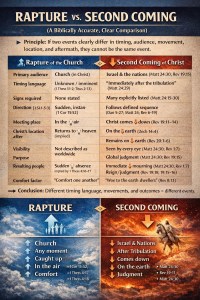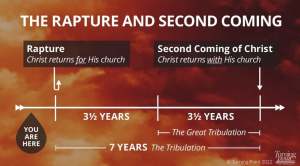 Have you ever had to stand before a judge? Hopefully not. But if you did, you found yourself at the mercy of the sentencing judge. If you were found guilty of breaking the law, the judge had the right to place the full weight of the law upon you. The possibility of this happening is a detriment to many people, and it prevents them from pursuing a life of crime. They do not want to face a judge’s wrath, so they choose to live on the right side of the law. A healthy fear of judgment keeps them straight.
Have you ever had to stand before a judge? Hopefully not. But if you did, you found yourself at the mercy of the sentencing judge. If you were found guilty of breaking the law, the judge had the right to place the full weight of the law upon you. The possibility of this happening is a detriment to many people, and it prevents them from pursuing a life of crime. They do not want to face a judge’s wrath, so they choose to live on the right side of the law. A healthy fear of judgment keeps them straight.
This begins the important discussion of the end time, of the end of the world
6 God is just: He will pay back trouble to those who trouble you 7 and give relief to you who are troubled, and to us as well. This will happen when the Lord Jesus is revealed from heaven in blazing fire with his powerful angels. 2 Thessalonians 1: 6-7
When Paul referred to the Second Coming in relation to believers, he favored the word parousia (“presence”; “coming”) as it was an encouragement and hopeful. For believers, Christ’s return is the presence of One they know and have an eternal relationship with.
But in verse 7 when Paul wrote the Lord Jesus will be revealed, he used a different word, apokalupsis (“revelation”; “unveiling”; “uncovering”). That word, which has the idea of manifesting what was previously hidden or secret (cf. Rom. 2:5; 16:25; 1 Cor. 14:6; 2 Cor. 12:1, 7; Gal. 1:12; Eph. 3:3), views the return of Christ in relation to unbelievers. The One who has been hidden will be revealed in all His sovereign glory to a world that does not know or worship Him. He will be unveiled as Judge (v. 8)
This Revelation or Second Coming of Jesus is different than the Rapture.
- They are not described the same.
- They do not happen the same way.
- They do not have the same purpose.
THE RAPTURE — A PROMISE OF COMFORT
“Then we which are alive and remain shall be caught up together with them in the clouds, to meet the Lord in the air… Therefore comfort one another with these words.”— 1 Thessalonians 4:17–18 (NKJV)
What do we see?
- Believers caught up
- Meeting Christ in the air
- No judgment described
- No wrath mentioned
- Ends with comfort
This event is:
- Sudden (“in a moment” — 1 Cor 15:52)
- Sign-less (“you know not when” — 1 Thessalonians 5:1–2)
- Directed to the Church
 THE SECOND COMING or REVELATION OF CHRIST — A DAY OF JUDGMENT
THE SECOND COMING or REVELATION OF CHRIST — A DAY OF JUDGMENT
“Immediately AFTER the tribulation… they shall see the Son of man coming in the clouds of heaven with power and great glory.” — Matthew 24:29–30 (NKJV)
“Look, He is coming with clouds; and every eye shall see him… and all people of the earth shall mourn because of Him.” — Revelation 1:7 (KJV)
What do we see?
- Clear timing: after the tribulation
- Christ returns to the earth
- Global visibility
- Mourning, fear, judgment
- Nations involved
“And his feet shall stand in that day upon the mount of Olives…”— Zechariah 14:4 (NKJV)
If the Rapture happens after the Great Tribulation:
- It is no longer imminent
- Watching becomes calculation
- Comfort becomes fear
- Believers are promised wrath they were told they would escape
- The Church must wait for Antichrist instead of Christ
“For God has NOT appointed us to wrath, but to obtain salvation by our Lord Jesus Christ.” — 1 Thessalonians 5:9 (NKJV)
For unbelievers, the Second Coming or Revelation of Jesus will bring bitter retribution; for believers, sweet relief.
THE EXECUTOR OF JUDGMENT: JESUS CHRIST HIMSELF (vv.7–8)
Note that Jesus Christ is coming to give rest to the believer as well as to judge the world. The believer will be free from the injustices, sufferings, and death of this world.
“There remains therefore a rest to the people of God” (He. 4:9).
Note that the Person who will execute judgment is Jesus Christ Himself. He is personally going to return to earth to judge the world.
1. His return in judgment will be a spectacular appearance from heaven. As mentioned above, the word revealed means to be unveiled and uncovered. The day is coming when Jesus Christ shall rend or split the heavens and return to earth in judgment. He will be revealed as the Supreme Majesty and Judge of the world.
“For the Father judges no man, but hath committed all judgment unto the Son” (Jn. 5:22).
2. His return in judgment will be with the angels of His power. The angels will return with Him for several purposes:
⇒ to add to the majestic glory and triumph of His person and presence.
“For the Son of man shall come in the glory of his Father with his angels…” (Mt. 16:27).
⇒ to carry out His orders and to execute His justice and mercy.
“The enemy that sowed them is the devil; the harvest is the end of the world; and the reapers are the angels” (Mt. 13:39).
3. His return in judgment will be in flaming fire. This is a reference to the brilliance and glory and holiness of His appearance, to the fact that He is coming in judgment. His return in judgment will be in all the majesty and glory of God Himself—so brilliant that it will be as the flaming fire of God’s pure holiness.
“And then shall appear the sign of the Son of man in heaven: and then shall all the tribes of the earth mourn, and they shall see the Son of man coming in the clouds of heaven with power and great glory” (Mt. 24:30).
THE PEOPLE TO BE JUDGED (v.8)
The people to be judged are separated into two classes.
1. All who do not know God, the only living and true God, shall be judged. Who are these persons? They are those who sin against natural revelation, who look at creation and fail to see God or to live by the laws that are clearly seen in nature and creation.
a. Men can know God within themselves: in their own thoughts, reasonings, and consciences.
“Because that which may be known of God is manifest in them; for God hath showed it unto them” (Ro. 1:19).
b. Men can know God outside of themselves: in creation and nature, the earth and outer space. (See Ro. 1:19; 1:20; 1:21; 2:11–15.)
“Nevertheless he left not himself without witness, in that he did good, and gave us rain from heaven, and fruitful seasons, filling our hearts with food and gladness” (Ac. 14:17).
The point is this: people can know that God gives them life, that He cares and provides for them, that He runs everything in an orderly and lawful way, giving purpose and meaning to life. They can look at nature and see that God is great and good; therefore, God deserves to be glorified and given thanks. But instead of seeing God and coming to know God, they have rejected Him. Instead of worshipping God …
• some worship the creation, that is, science and man—a humanistic worship
• some worship the god of their imagination, a thought or image of what God is (a god that allows them to live as they desire)
They are the persons who are to be judged. They are the persons who do not know the living and true God, not personally—not in a personal day-to-day relationship.
2. All who do not obey the gospel of our Lord Jesus Christ shall be judged. Who are these persons?
⇒ Every person who has ever heard the gospel of Jesus Christ and rejected it.
⇒ Every person who has knowledge the gospel of Jesus Christ, but did nothing with it and does not have a personal relationship or knowledge of Jesus.
Then I will tell them plainly, ‘I never knew you. Away from me, you evildoers!’ Matthew 7:23
Each of us professing Christians needs to take certain steps to make sure that we know Christ personally, not just about Him. Ask Him in your life, live for Him, and look forward to his return.
Message Audio/Video and Outline: https://upwards.church/leander-campus/watch-now-message-videos
Watch Messages: YouTube-Upwards Church
Read Along Daily Bible Reading: You Version

